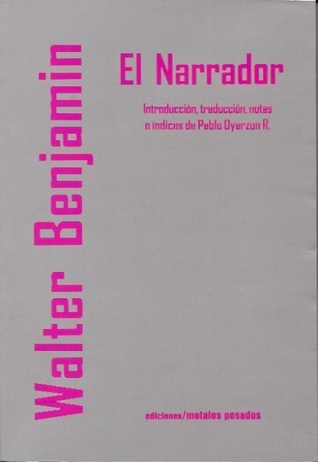
Il narratore è un breve saggio scritto da Walter Benjamin nel 1936 e destinato a rimanere nel tempo un testo di riferimento per qualunque riflessione sullo statuto del narrare. Il suo pretesto è l'opera di Nikolaj Leskov, scrittore russo contemporaneo di Tolstoj e Dostoevskij, ma lo scopo è ricostruire la figura del narratore, i grandi e semplici tratti autentici che lo contraddistinguono, riportarne alla luce il significato originario. Ma non solo. Raccontando con una precisa drammaturgia da dove mai venga il narratore, Benjamin ci lascia in eredità la descrizione ideale di che cosa ancora oggi dovrebbe rappresentare chi narra storie, una figura che, innalzata nella cerchia dei maestri e dei saggi, «sa orientarsi sulla terra senza avere troppo a che fare con essa». Ad accompagnarci alla scoperta di questo piccolo saggio è Alessandro Baricco che, con una nota introduttiva, una conclusiva e un commento puntuale a ogni capitolo, ci aiuta a comprendere perché Benjamin, meglio di ogni altro, può introdurci a riflettere su cosa mai veramente sia «il sortilegio della narrazione».
Author

Walter Bendix Schönflies Benjamin was a German-Jewish Marxist literary critic, essayist, translator, and philosopher. He was at times associated with the Frankfurt School of critical theory and was also greatly inspired by the Marxism of Bertolt Brecht and Jewish mysticism as presented by Gershom Scholem. As a sociological and cultural critic, Benjamin combined ideas drawn from historical materialism, German idealism, and Jewish mysticism in a body of work which was a novel contribution to western philosophy, Marxism, and aesthetic theory. As a literary scholar, he translated the Tableaux Parisiens edition of Baudelaire's Les Fleurs du mal as well as Proust's In Search of Lost Time. His work is widely cited in academic and literary studies, in particular his essays The Task of the Translator and The Work of Art in the Age of Mechanical Reproduction. Influenced by Bachofen, Benjamin gave the name "auratic perception" to the aesthetic faculty through which civilization would recover a lost appreciation of myth.